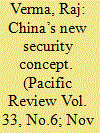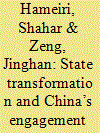|
|
|
Sort Order |
|
|
|
Items / Page
|
|
|
|
|
|
|
| Srl | Item |
| 1 |
ID:
175065


|
|
|
|
|
| Summary/Abstract |
This article analyzes counterterrorism (CT) measures that have been developed and implemented since the 2002 Bali attacks, paying special attention to the presidencies of Yudhoyono and Widodo. On the basis of anti-terrorism concepts, current findings of anti-terrorism research will be applied to the case of Indonesia, whereby we will distinguish between reactive and preventive measures and will show how they interact. Here, the revision of existing anti-terror laws carried out by the Indonesian Parliament in May 2018 will receive particular attention. As will be documented, in spite of the initially quite promising short-term effects of CT measures, the already strained relationship between the police and the military regarding jurisdiction has become even more critical in recent years. Since only a few religious or civil authorities have been included to a large extent in attempts to prevent terrorism, these measures are not likely to be as effective and lasting as they might have been.
|
|
|
|
|
|
|
|
|
|
|
|
|
|
|
|
| 2 |
ID:
175064


|
|
|
|
|
| Summary/Abstract |
The paper seeks to provide an answer to the question which has hitherto not been significantly explored in the relevant academic scholarship: Why did China block India’s (and other countries) attempts to designate Masood Azhar – head of Jaish-e-Mohammad (JeM/Jaish) as terrorist under UN Security Council 1267 committee rules? According to the extant literature, China's actions are explained broadly by India-China rivalry and India-Pakistan rivalry resulting in a strategic and ‘all weather partnership between China and Pakistan against their common enemy India. This study argues that China’s actions are also explained by its New (Asian) Security Concept and the ensuing China Pakistan Economic Corridor (CPEC), domestic (in)stability in Pakistan and China’s geo-strategic interests. China is deeply perturbed by the socio-economic-political instability in Pakistan. China was concerned that if Masood Azhar was designated as a terrorist under UNSC 1267 Committee rules, Jaish and other terrorist organizations would take up arms against the Pakistani state (as in the past) which will create further instability in Pakistan and undermine CPEC and China’s geo-strategic interests. Thus, the paper provides a more comprehensive and nuanced grasp of China’s reluctance to designate Masood Azhar as a terrorist.
|
|
|
|
|
|
|
|
|
|
|
|
|
|
|
|
| 3 |
ID:
175060


|
|
|
|
|
| Summary/Abstract |
This study examines state-private firm coordination in China’s corporate globalization with a focus on cross-border mergers and acquisitions in Southeast Asia. The profile of China’s private firms in the country’s overseas economic expansion has risen dramatically over the past few years, but the controversy continues as to what extent they coordinate their overseas activities with the state. This is because Chinese private firms, not unlike state-owned enterprises, have political economy reasons to subject their corporate decision-making to state preferences. Still, the outcomes of state-firm coordination in private sector internationalization vary. In some transactions, the state and private firms form a strong partnership through elaborate policies and financing; others see some alignment that is not decisive for transaction outcomes; and still others see minimal, almost rhetorical engagement. The varied outcomes can be explained by the combination of foreign direct investment (FDI) motives and the technology intensity of the target industry. We propose a framework drawn from the international business theory of FDI motives and the literature on China’s techno-industrial policy to classify different types of state-private sector coordination. We survey recent developments in China’s cross-border acquisitions in Southeast Asia and provide illustrative case studies to support our argument.
|
|
|
|
|
|
|
|
|
|
|
|
|
|
|
|
| 4 |
ID:
175061


|
|
|
|
|
| Summary/Abstract |
Debates over the implications of China’s rise for global governance have reached an impasse, since evidence exists to support both ‘revisionist’ and ‘status-quo’ intentions. This means that neither is strictly falsifiable and hence the debate, as currently structured, is irresolvable. However, contradictions are explicable if we recognise that China is not a unitary state. Since the beginning of the reform era, its international engagements have been shaped by the uneven transformation – fragmentation, decentralisation and internationalisation – of state apparatuses. Contradictory international actions thus may reflect not top-down strategic direction, but conflicts, disagreements and coordination problems within China’s transformed party-state. Our state transformation approach directs us away from evaluating China’s approach to global governance in toto – whether it is overall a revisionist or status quo power – towards a detailed analysis of particular policy domains. This is because in each issue-area we find different constellations of actors and interests, and varying degrees of party-state transformation. We demonstrate the centrality of state transformation analysis for explaining the co-existence of revisionist and status quo behaviours through the apparently hard test case of nuclear technologies. Even in this ‘high politics’ domain, state transformation dynamics help explain China’s inconsistent international behaviours.
|
|
|
|
|
|
|
|
|
|
|
|
|
|
|
|
| 5 |
ID:
175063


|
|
|
|
|
| Summary/Abstract |
China’s exchange-rate regime reform policies have fluctuated since the early 1990s, experiencing at least six significant policy changes: 1994 unification, 1998 stabilization, 2005 reform, 2008 stagnation, 2010 relaunch and 2015 ‘8•11’ reform. This policy fluctuation plausibly suggests that China has behaved as a speculative pragmatist without being disciplined by established and consistent values, principles or national interests, particular against the backdrop of the current international power transition. Adopting an integrative Foreign Policy Analysis (FPA) analytical framework that differentiates and bridges International Relations (IR) national interests with FPA policy motivations, this article compares the six policy changes and argues that China has been a steadfast reformer rather than a speculative pragmatist since the early 1990s. Namely, the market-oriented exchange-rate regime reform has consistently reflected China’s national interest since the early 1990s, notwithstanding occasional policy fluctuations that diverge from the national interest. This integrative analysis contributes to transcending the ‘holism failure’ of IR studies by looking into the specific decision-making processes, and escaping from the ‘reductionist gamble’ of FPA studies by examining the long-term tendency and interests behind these apparently inconsistent policies.
|
|
|
|
|
|
|
|
|
|
|
|
|
|
|
|
| 6 |
ID:
175062


|
|
|
|
|
| Summary/Abstract |
The article sheds light on a series of cognitive features and cultural determinants ingrained in the historical evolution of Myanmar’s alignment choices vis-à-vis regional great-powers. Building upon Alastair Johnston’s conceptualisation of ‘strategic culture’, the study traces the genesis, articulation, and perpetuation of a distinctive set of beliefs and assumptions embraced by different generations of Burmese decision-makers to cope with the country’s security dilemma. Accordingly, Myanmar’s hedging attitude in the midst of the ongoing Sino-American rivalry is presented as a further manifestation of its deep-rooted neutralist practice, which was firstly employed to navigate the perilous waters of the Cold War and then evolved into a crucial standard of conduct to safeguard a relative degree of autonomy in the shadow of a rising China.
|
|
|
|
|
|
|
|
|
|
|
|
|
|
|
|
|
|
|
|
|